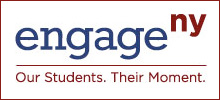11.8 - World War II
From EngageNY
The participation of the United States in World War II was a transformative event for the nation and its role in the world.11.8a As situations overseas deteriorated, President Roosevelt’s leadership helped to move the nation from a policy of neutrality to a pro-Allied position and, ultimately, direct involvement in the war.
- Students will examine reasons for the passage of the Neutrality Acts (1935–1937) and consider the national debate as a shift to pro-Allied policies, including “cash and carry” and Lend-Lease.
- Students will trace ongoing negotiations with Japan and United States efforts to stop Japanese aggression without resorting to war and without appeasing Japanese demands.
- Students will examine the impact of the Japanese attack on Pearl Harbor.
- Students will examine President Roosevelt’s leadership during World War II, including his role as commander in chief and his diplomatic efforts to maintain the Grand Alliance.
- Students will examine how technological advancements altered the nature of war and the extent of its devastation, including the use of air power over civilian targets and President Truman’s decision to use the atomic bomb against the Japanese cities of Hiroshima and Nagasaki.
- Students will examine United States mobilization efforts and wartime production and their effects on unemployment rates.
- Students will examine the reasons for President Roosevelt’s executive order for Japanese removal, the impact of removal on Japanese people living in the United States, and the Supreme Court’s decision in Korematsu v. United States (1944).
- Students will examine the contributions of women, African Americans, Native Americans, Asian Americans, Mexican workers, and Mexican Americans to the war effort, as well as the discrimination that they experienced in the military and workforce.
- Students will investigate American officials' knowledge of the Holocaust, evaluating the degree to which intervention may have been possible.
- Students will examine the contributions of Supreme Court Justice Robert Jackson and his arguments made as Chief Prosecutor for the United States at the Nuremberg War Crimes trials.
- Students will investigate the role of Eleanor Roosevelt in creating the United Nations Universal Declaration of Human Rights.
Learn more on Engage NY
EngageNY.org is developed and maintained by the New York State Education Department (NYSED) to support the implementation of key aspects of the New York State Board of Regents Reform Agenda.
This is the official web site for current materials and resources related to the Regents Reform Agenda. The agenda includes the implementation of the New York State P-12 Common Core Learning Standards (CCLS), Teacher and Leader Effectiveness (TLE), and Data-Driven Instruction (DDI). EngageNY.org is dedicated to providing educators across New York State with real-time, professional learning tools and resources to support educators in reaching the State’s vision for a college and career ready education for all students.














